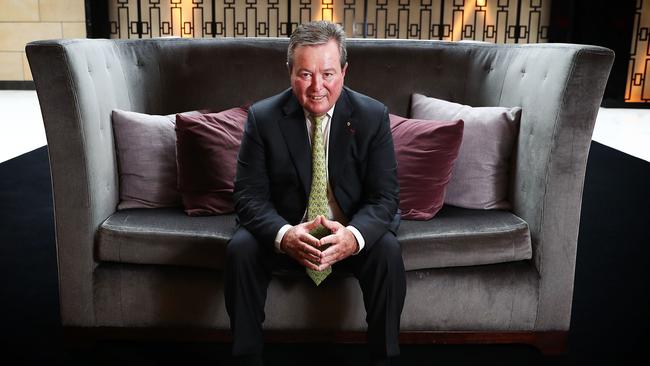Star chair John O’Neill calls for end to bank bashing
Star Entertainment chairman John O’Neill has called on politicians to stop bank bashing.

Star Entertainment chairman John O’Neill has called on politicians to stop bank bashing.
“I’m not a fan of bank bashing,” he said in an interview with The Australian.
“I can appreciate anger and resentment but I don’t think federal and state governments bashing banks is a sensible tactic.
“It may be popular to do so — the politicians want to win political kudos by belting up on the banks — but in reality there are other ways of having the banks improve their practices around financial planning and advice.
“It’s imperative, for the sake of the economy, to ensure that the banking system is strong and secure.”
Mr O’Neill, a former banker, said banks had “ridden the wave of prosperity” of an economy with 26 years’ consecutive growth. But this could change if the economy turned down for a period.
“If Australia were to go into a downturn, there is a probability that the banks would be affected. Banks ride the wave of prosperity, but they can’t carry the burden of a downturn.”
He said the banks were not involved in causing the global financial crisis — a major reason behind anti-bank sentiment offshore. He said politicians needed to be specific in their attacks on the banks, spelling out exactly what they were supposed to have done wrong and take specific measures to address the issues.
Mr O’Neill was one of the youngest ever chief executives of a bank when he was appointed to run the State Bank of NSW in 1987 at the age of 35.
He ran the bank through the recession of the early 1990s, stepping down in 1995 to take over as chief executive of the Australian Rugby Union, where he oversaw the transition of the game from amateur to professional.
Mr O’Neill said global anger against banks was prompted by the actions of bankers offshore, which led to the GFC. Americans were angry at their bankers who, they believed, caused the crisis and soon after returned to business as usual, paying themselves huge salaries.
“The American public says, ‘these blokes caused the problem and yet they are back earning millions of dollars in salaries and bonuses’,” he said. “That gap between the haves and the have note is deeply felt in the US. But there is nothing that the Australian banks did to cause the GFC.”
Mr O’Neill said if the government wanted to raise money by imposing a major tax on the banks it would be better to formally consider it a levy in return for government backing in terms of a crisis.
“The response of the government in supporting the banks through the global financial crisis in Australia gave people the impression that the government stands behind the banks,” he said.
“It may have been better to explain the levy as an insurance premium the banks are paying for government support.”
Mr O’Neill said the bank levy had “morphed very quickly from a levy to a tax — and then the popular media were easily able to attach it to bank bashing”.
He said the Australian banking system was “one of the best in the world.”
He could not understand the legal basis for the move by the South Australian government to impose its own levy on the banks. “I can’t comprehend on what basis a state government can tax a federally licensed bank,” he said.
“They are already paying federal income tax and they are going to pay this new levy. We all know state governments, apart from NSW, all have revenue cliffs they are standing on the edge of.”
He feared South Australia’s plan to impose a bank levy would lead to banks saying they would not do business in the state.
“South Australia needs all the help it can get from investors, and banks play a pretty significant role in the South Australian economy.”
Mr O’Neill said the market share of the big four banks now was similar to when he was in banking in the early 90s.
This was “no bad thing as long as there is proper competition and proper choice”.
The business of banking was now significantly more challenging than when he was a banker — when depositors’ money flowed into non-interest bearing cheque accounts.
“We used call them ‘candys’ — current account no bearing interest deposits,” he said.
“As a banker would you would just keep your head down and think, ‘How good is this?’.
“You had all this money sitting in savings accounts and cheque accounts not paying any interest.”
But there had been a big change in banking in Australia with the banks now paying interest on many more accounts.
“There has been a paradigm shift around the way banks fund themselves,” he said.



